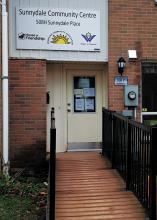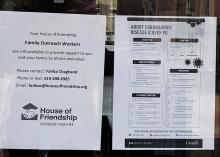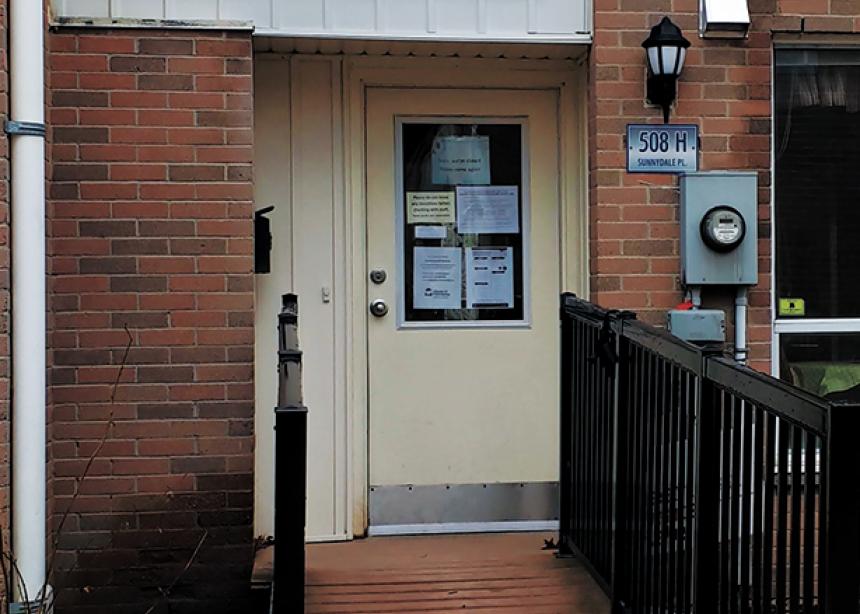How do you stay home when you don’t have a home? How do you physically isolate when you already seem invisible? How do you wash your hands frequently when public facilities are closed?
For people who are struggling, the COVID-19 pandemic adds “another layer of challenge,” says John Neufeld, executive director of the House of Friendship (HoF), a Waterloo Region-based non-profit organization that provides food, housing, addiction treatment and neighbourhood support to some 40,000 people a year.
As public health officials and government leaders announced new physical distancing measures, organizations that serve the most vulnerable people scrambled to meet those standards while still providing essential care.
For HoF, “everything had to change,” according to Neufeld. Almost overnight, “we had to learn how to be a virtual organization.”
The organization had to shut down its community centres and their programs, which means outreach workers now offer counselling and support by phone. Regular food distribution had to adapt, too. Now pre-packaged food is handed out from the back of a truck, instead of people assembling their own food inside the centres. And, while the residential addiction treatment program continues, addiction counselling is done by phone.
The biggest change involved the men’s shelter. During a video call with community partners in response to new social distancing directives from the government, Neufeld admitted they were in trouble. The “close quarters” for some 50 men was a problem. But, before that video conference was over, Neufeld received an email from a local hotel manager stepping up with an offer. He promised that beds in his hotel could be ready for the men from the shelter tomorrow! “Somebody has to do this,” he said.
By supper time the next day, all the men from the shelter had been screened for COVID-19 symptoms, bused to the hotel and settled into their rooms, where they are monitored by medical personnel and supported by shelter workers around the clock.
Neufeld describes the move as “an incredible experience” of “God’s presence” at work. In less than 24 hours HoF moved the men’s shelter to a space that made physical distancing possible and provided a floor in the hotel for anyone who needed to self-isolate. And it implemented a vision, intended to take three to five years, that integrates health care into shelters. Neufeld calls it “God’s humour” that it all happened in 24 hours.
‘Presence in the face of pandemic’
Margaret Nally, a spiritual caregiver in community ministry, says people have “no roadmap” for the pandemic crisis enveloping the world. She sees her role as “[holding] the centre . . . a sacred space that is grounded in the comfort and care of the Creator of all.”
Drawing on spiritual resources and prayer practices, she tends to the well-being of frontline social and health-care workers. “We need them,” she says. They are “often quite young,” and they are doing “heroic work.”
She meets with them via phone or other media, encouraging them to “pay attention to what is breaking hearts and lifting spirits.” She says this “releases people into the care of the One who created them, and opens time and space to place in God’s keeping the whole story of the work day.” She calls it practising “presence in the face of pandemic.”
Neufeld and Nally acknowledge that, while the pandemic affects everyone in some way, it is not an equal-opportunity crisis. It affects the most vulnerable people more severely and exposes societal gaps. For Nally, it is a “real awakening to a broader reflection.” She says it calls everyone to “constant vigilance . . . to pay attention to who isn’t at our tables and in our programs.”
Nally sees this as a unique time to stop, be still and turn inward, “breathing deeply into the assurance that God is with us in this time.”
She insists that “every positive way of being present with others matters.” She offers some suggestions:
- Pray for those who are “in the whirlwind of care of others.”
- Get involved in sewing projects, providing gowns, caps and masks for outreach workers and frontline nurses.
- Send encouraging notes and cards to those who are alone, or living in grief or fear.
- Be a positive presence on social media.
- Place messages of hope in your windows.
“Let us be those who live in the light for those who dwell in the shadows,” she says.
Do you have a story idea about Mennonites in Eastern Canada? Send it to Janet Bauman at ec@canadianmennonite.org.
Related stories:
MCC set to address COVID-19 threats
Westview adapts outreach during pandemic
Bread, masks and serving seniors

House of Friendship’s Sunnydale Community Centre, usually a hub for a diverse range of community programs, is quiet, its programs cancelled or modified due to pandemic protocols outlined in the notices on the door. (Photo by Janet Bauman)

House of Friendship’s Sunnydale Community Centre, usually a hub for a diverse range of community programs, is quiet, its programs cancelled or modified due to pandemic protocols outlined in the notices on the door.
Notices on the door of House of Friendship’s Sunnydale Community Centre in Waterloo, Ont., explain the pandemic protocols that have led to the closure of the centre and the cancellation or modification of its diverse range of community programs. (Photo by Janet Bauman)



Add new comment
Canadian Mennonite invites comments and encourages constructive discussion about our content. Actual full names (first and last) are required. Comments are moderated and may be edited. They will not appear online until approved and will be posted during business hours. Some comments may be reproduced in print.